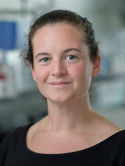Glutamine independence is a selectable feature of pluripotent stem cells Research Letter
| Authors: | Vardhana, S. A.; Arnold, P. K.; Rosen, B. P.; Chen, Y.; Carey, B. W.; Huangfu, D.; Carmona-Fontaine, C.; Thompson, C. B.; Finley, L. W. S. |
| Title: | Glutamine independence is a selectable feature of pluripotent stem cells |
| Abstract: | Most rapidly proliferating mammalian cells rely on the oxidation of exogenous glutamine to support cell proliferation. We previously found that culture of mouse embryonic stem cells in the presence of inhibitors against mitogen-activated protein kinase kinase and glycogen synthase kinase 3 beta to maintain pluripotency reduces cellular reliance on glutamine for tricarboxylic acid cycle anaplerosis, enabling embryonic stem cells to proliferate in the absence of exogenous glutamine. Here we show that reduced dependence on exogenous glutamine is a generalizable feature of pluripotent stem cells. Enhancing self-renewal, through either overexpression of pluripotency-associated transcription factors or altered signal transduction, decreases the use of glutamine-derived carbons in the tricarboxylic acid cycle. As a result, cells with the highest potential for self-renewal can be enriched by transient culture in glutamine-deficient media. During pluripotent cell culture or reprogramming to pluripotency, transient glutamine withdrawal selectively leads to the elimination of non-pluripotent cells. These data reveal that reduced dependence on glutamine anaplerosis is an inherent feature of self-renewing pluripotent stem cells and reveal a simple, non-invasive mechanism to select for mouse and human pluripotent stem cells within a heterogeneous population during both embryonic stem cell passage and induced pluripotent cell reprogramming. © 2019, The Author(s), under exclusive licence to Springer Nature Limited. |
| Keywords: | signal transduction; nonhuman; flow cytometry; letter; animal cell; mouse; metabolism; animal tissue; stat3 protein; image analysis; embryonic stem cell; green fluorescent protein; animal experiment; immunofluorescence; biosynthesis; cell culture; janus kinase; self concept; cell count; pluripotent stem cell; c57bl 6 mouse; fluorescence activated cell sorting; experimental design; glutamine; transcription factor nanog; nuclear reprogramming; kruppel like factor 4; tissue culture; rho factor; citric acid cycle; colony formation; isotope tracing; mitogen activated protein kinase kinase inhibitor; cell volume; glycogen synthase kinase 3 inhibitor; mouse embryonic stem cell; human embryonic stem cell |
| Journal Title: | Nature Metabolism |
| Volume: | 1 |
| Issue: | 7 |
| ISSN: | 2522-5812 |
| Publisher: | Nature Publishing Group |
| Date Published: | 2019-07-01 |
| Start Page: | 676 |
| End Page: | 687 |
| Language: | English |
| DOI: | 10.1038/s42255-019-0082-3 |
| PROVIDER: | scopus |
| PMCID: | PMC6737941 |
| PUBMED: | 31511848 |
| DOI/URL: | |
| Notes: | Letter -- Export Date: 1 November 2019 -- Source: Scopus |
Altmetric
Citation Impact
BMJ Impact Analytics
Related MSK Work










